

Censorship and Mark Twain's Adventures of Huckleberry Finn. Context 60 Second Recap Huck. The Adventures of Huckleberry Finn Mark Twain, 1884Famous for: Larger-than-life characters, a searing message about slavery, and language that may make you uncomfortable (so check out Recap 5).

Let’s not mince words. There’s some vocabulary in The Adventures of Huckleberry Finn that will leave you feeling more than a little uncomfortable. The good news is, context helps. Huckleberry Finn. What Is a Banned Book? Why Books are Banned: Common Reasons for Censorship and Challenges of Reading Materials. Books have been banned all over the world for many reasons.
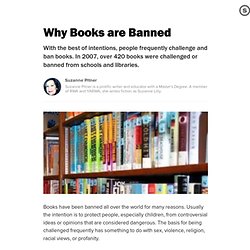
Usually the intention is to protect people, especially children, from controversial ideas or opinions that are considered dangerous. – USATODAY.com. School is starting up again, and later this month we will celebrate another national tradition: Banned Books Week, which since 1982 takes place every year during the last week of September.
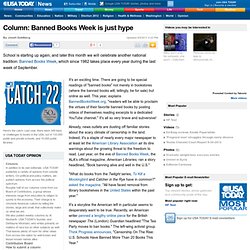
It's an exciting time. There are going to be special readings of "banned books" not merely in bookstores (where the banned books will, tellingly, be for sale) but online as well. This year, explains BannedBooksWeek.org, "readers will be able to proclaim the virtues of their favorite banned books by posting videos of themselves reading excerpts to a dedicated YouTube channel. " It's all so very brave and subversive! Already, news outlets are dusting off familiar stories about the scary climate of censorship in the land.
"What do books from the Twilight series, To Kill a Mockingbird and Catcher in the Rye have in common? " It's a storyline the American left in particular seems to desperately want to be true. No, not true The problem: None of this is remotely true. Numbers tell it all. Banned and Challenged Classics. Each year, the ALA's Office for Intellectual Freedom records hundreds of attempts by individuals and groups to have books removed from libraries shelves and from classrooms.

See Frequently Challenged Books for more details. According to the Office for Intellectual Freedom, at least 46 of the Radcliffe Publishing Course Top 100 Novels of the 20th Century have been the target of ban attempts. The titles below represent banned or challenged books on that list ( see the entire Radcliffe Publishing Course list here). For more information on why these books were challenged, visit challenged classics and the Banned Books Week Web site.
The titles not included may have been banned or challenged, but we have not received any reports on them. 1. 11. 15. 23. 33. 36. 38. 40. 45. 48. Censoring Mark Twain. Huck Controversy. Mark Twain's Adventures of Huckleberry Finn 1885 Samuel Clemens, whose pen name is Mark Twain, publishes Adventures of Huckleberry Finn in 1885 in America.

He has been at work for eight years on the story of an outcast white boy, Huck, and his adult friend Jim, a runaway slave, who together flee Missouri on a raft down the Mississippi River in the 1840s. The book's free-spirited and not always truthful hero as well as its lack of respect for religion or adult authority draw immediate fire from newspaper critics.
The ungrammatical vernacular voice in which Huck narrates the book is also attacked as coarse and inappropriate. Is Huck Racist? Is Huckleberry Finn really a racist book?
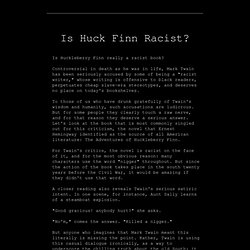
Controversial in death as he was in life, Mark Twain has been seriously accused by some of being a "racist writer," whose writing is offensive to black readers, perpetuates cheap slave-era stereotypes, and deserves no place on today's bookshelves. To those of us who have drunk gratefully of Twain's wisdom and humanity, such accusations are ludicrous. But for some people they clearly touch a raw nerve, and for that reason they deserve a serious answer. Fugitive Slave Act. Deleting the N Word. Mark Twain's Adventures of Huckleberry Finn is a classic by most any measure—T.S.

Eliot called it a masterpiece, and Ernest Hemingway pronounced it the source of "all modern American literature. " Yet, for decades, it has been disappearing from grade school curricula across the country, relegated to optional reading lists, or banned outright, appearing again and again on lists of the nation's most challenged books, and all for its repeated use of a single, singularly offensive word: "nigger. " Twain himself defined a "classic" as "a book which people praise and don't read. " Editions Without the N Word. 6 January 2011Last updated at 12:18.
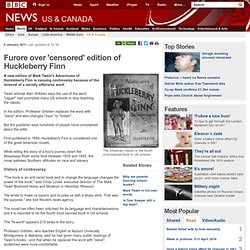
Library of Congress. Edwin Hergesheimer.
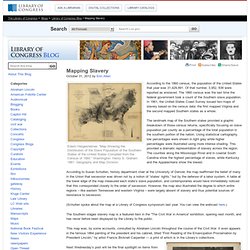
“Map Showing the Distribution of the Slave Population of the Southern States of the United States Compiled from the Census of 1860.” Washington: Henry S. Graham 1861. Geography and Map Division. Video: Huck and the N Word. The "N" word and Huckleberry Finn. Twain to the Librarian Banning His Book. As you might have already heard, it’s Banned Books Week, and booksellers, librarians, and literary critics of all kinds are taking the opportunity to celebrate their favorite once-banned (or oft-banned) literature.
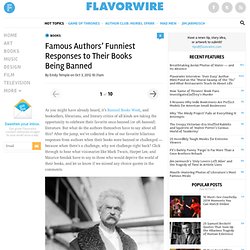
But what do the authors themselves have to say about all this?